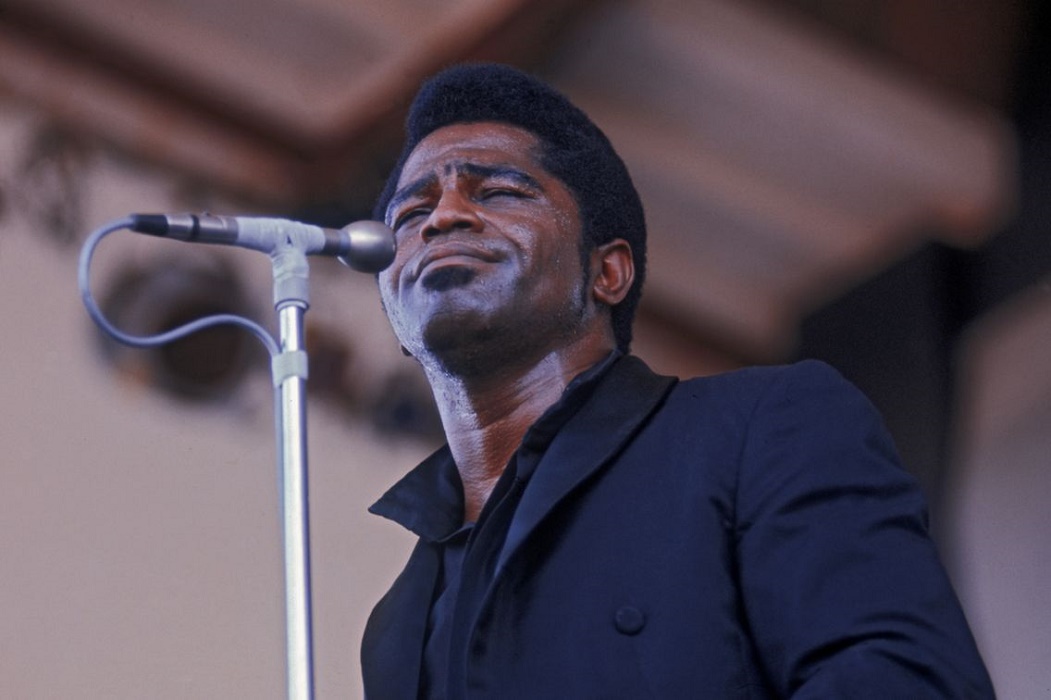The GodFather Of Soul Part 1.
James Brown.
James Joseph Brown May 3, 1933 – December 25, 2006. Was an American singer, dancer & musician. The central progenitor of funk music & a major figure of 20th century music, he is referred to by various nicknames, among them King of Soul, The Hardest-Working Man in Show Business, Minister of New Super Heavy Funk, Godfather of Soul, “Mr. Dynamite, & “Soul Brother No. 1. In a career that lasted more than 50 years, he influenced the development of several music genres. Brown was one of the first 10 inductees into the Rock & Roll Hall of Fame on January 23, 1986. His music has been heavily sampled by hip-hop musicians & other artists.
Brown began his career as a gospel singer in Toccoa, Georgia. He rose to prominence in the mid 1950s as the lead singer of the Famous Flames, A rhythm & blues vocal group founded by Bobby Byrd. With the hit ballads Please, Please, Please & Try Me, Brown built a reputation as a dynamic live performer with the Famous Flames & his backing band, sometimes known as the James Brown Band or the James Brown Orchestra. His success peaked in the 1960s with the live album Live at the Apollo & hit singles such as Papa’s Got a Brand New Bag, I Got You (I Feel Good), & It’s a Man’s Man’s Man’s World.

During the late 1960s, Brown moved from a continuum of blues & gospel-based forms & styles to a new approach to music making, emphasizing stripped down interlocking rhythms that influenced the development of funk music. By the early 1970s, Brown had fully established the funk sound after the formation of the J.B.s with records such as Get Up (I Feel Like Being a) Sex Machine, & The Payback. He also became noted for songs of social commentary, including the 1968 hit, Say It Loud – I’m Black & I’m Proud. Brown continued to perform & record until his death from pneumonia in 2006.
James Brown recorded & released 17 singles that reached No. 1 on the Billboard R&B charts. He also holds the record for the most singles listed on the Billboard Hot 100 chart that did not reach No. 1. Brown was posthumously inducted into the first class of the Rhythm & Blues Music Hall of Fame in 2013 as an artist & then in 2017 as a songwriter. He received honors from several other institutions, including inductions into the Black Music & Entertainment Walk of Fame & the Songwriters Hall of Fame. In Joel Whitburn’s analysis of the Billboard R&B charts from 1942 to 2010, Brown is ranked No. 1 in the Top 500 Artists. He is ranked seventh on Rolling Stone’s list of the 100 Greatest Artists of All Time, & at No. 44 on their list of the 200 Greatest Singers of All Time.

James Brown was born on May 3, 1933, in Barnwell, South Carolina, to 16 year old Susie also known as née Behling, 1917–2004) & 21 year old Joseph Gardner Brown (1912–1993) in a small wooden shack. Brown’s name was supposed to have been Joseph James Brown, but his first & middle names were mistakenly reversed on his birth certificate. In his autobiography, Brown stated that his father was of mixed African American & Native American descent, while his mother was of mixed African American & Asian descent.
The Brown family lived in poverty in Elko, South Carolina, which was an impoverished town in 1933. They moved to Augusta, Georgia, when James was four or five. His family first settled at one of his aunts’ brothels. They later moved into a house shared with another aunt. Brown’s mother eventually left the family after a contentious & abusive marriage & moved to New York. He began singing in talent shows as a young child, first appearing at Augusta’s Lenox Theater in 1944, winning the show after singing the ballad So Long. While in Augusta, Brown performed buck dances for change to entertain troops from Camp Gordon at the start of World War II as their convoys traveled over a canal bridge near his aunt’s home. This is where he first heard the legendary blues musician Howlin’ Wolf play guitar. He learned to play the piano, guitar, & harmonica during this period. He became inspired to become an entertainer after hearing Caldonia, By Louis Jordan & his Tympany Five. In his teen years, Brown briefly had a career as a boxer.

At the age of 16, he was convicted of robbery & sent to a juvenile detention center in Toccoa. There, he formed a gospel quartet with four fellow cellmates, including Johnny Terry. Brown met singer Bobby Byrd when the two played against each other in a baseball game outside the detention center. Byrd discovered that Brown could sing after hearing of, A guy called Music Box, which was Brown’s nickname at the prison. Byrd has since said he & his family helped to secure an early release, which led to Brown promising the court he would, Sing for the Lord. Brown was released on a work sponsorship with Toccoa business owner S. C. Lawson. Lawson was impressed with Brown’s work ethic & secured his release with a promise to keep him employed for two years. Brown was paroled on June 14, 1952. Brown went on to work with both of Lawson’s sons, & came back to visit the family from time to time throughout his career. Shortly after being paroled he joined the gospel group the Ever Ready Gospel Singers, featuring Byrd’s sister Sarah.
Brown joined Bobby Byrd’s group in 1954. The group had evolved from the Gospel Starlighters, an a cappella gospel group, to an R&B group with the name The Avons. He reputedly joined the band after one of its members, Troy Collins, died in a car crash. Along with Brown & Byrd, the group consisted of Sylvester Keels, Doyle Oglesby, Fred Pulliam, Nash Knox & Nafloyd Scott. Influenced by R&B groups such as Hank Ballard & the Midnighters, the Orioles & Billy Ward & his Dominoes, the group changed its name, first to the Toccoa Band & then to the Flames. Nafloyd’s brother Baroy later joined the group on bass guitar. Brown, Byrd & Keels switched lead positions & instruments, often playing drums & piano. Johnny Terry later joined, by which time Pulliam & Oglesby had long left.
Berry Trimier became the group’s first manager, booking them at parties near college campuses in Georgia & South Carolina. The group had already gained a reputation as a good live act when they renamed themselves The Famous Flames. In 1955, the group contacted Little Richard while performing in Macon. Richard convinced the group to get in contact with his manager at the time, Clint Brantley, at his nightclub. Brantley agreed to manage them after seeing the group audition. He then sent them to a local radio station to record a demo session, where they performed their own composition, Please, Please, Please, which was inspired when Little Richard wrote the words of the title on a napkin & Brown was determined to make a song out of it.

The Famous Flames eventually signed with King Records’ Federal subsidiary in Cincinnati, Ohio, & issued a re-recorded version of Please, Please, Please, In March 1956. The song became the group’s first R&B hit, selling over a million copies. None of their follow-ups gained similar success. In 1957, Brown replaced Clint Brantley as manager & hired Ben Bart, chief of Universal Attractions Agency. In 1957 the original Flames broke up, after Bart changed the name of the group to, James Brown & His Famous Flames. In October 1958, Brown released the ballad, Try Me, which hit number one on the R&B chart in the beginning of 1959, becoming the first of seventeen chart topping R&B hits. Shortly afterwards, he recruited his first band, led by J. C. Davis, & reunited with Bobby Byrd who joined a revived Famous Flames lineup that included Eugene “Baby” Lloyd Stallworth & Bobby Bennett, with Johnny Terry sometimes coming in as the, Fifth Flame. Brown, the Flames, & his entire band debuted at the Apollo Theater on April 24, 1959, opening for Brown’s idol, Little Willie John.
Federal Records issued two albums credited to Brown & the Famous Flames. Both contained previously released singles. In 1960, Brown began multi-tasking in the recording studio involving himself, his singing group, the Famous Flames, & his band, a separate entity from the Flames, sometimes named the James Brown Orchestra or the James Brown Band. In 1960, the band released the top ten R&B hit, (Do the) Mashed Potatoes on Dade Records, owned by Henry Stone, billed under the pseudonym, Nat Kendrick & the Swans, Due to label issues. As a result of its success, King president Syd Nathan shifted Brown’s contract from Federal to the parent label, King, which according to Brown in his autobiography meant, You got more support from the company. While with King, Brown, under the Famous Flames lineup, released the hit filled album Think! & in 1961 released two albums with the James Brown Band earning second billing. With the Famous Flames, Brown sang lead on several more hits, including, Bewildered, I’ll Go Crazy, & Think, songs that hinted at his emerging style.




